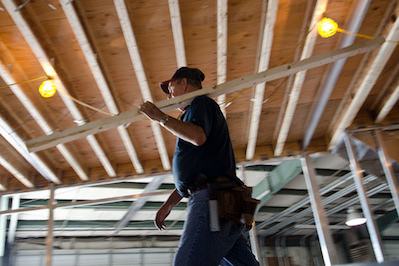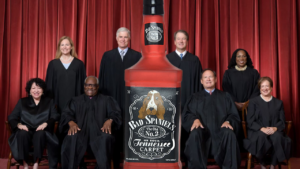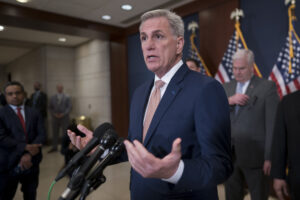To Save the United States, Progressives Must Dispel the Economic Pain That Enabled Donald Trump
That begins with understanding how Democrats failed to address the mass trauma wrought by deindustrialization and its resulting racism.
U.S. Department of Agriculture / CC-BY-2.0
Why do white working-class Americans — a group analysts are rushing to understand after it helped Donald Trump win the presidency this month — vote against their own interests?
“They don’t,” writes veteran community organizer Kirk Noden at The Nation. “Corporate Democrats have never advanced their interests, while Republicans offer a basic, if misleading, story about why they are getting screwed,” he explains.
Consider the following two stories the major parties tell about the collapse of America’s industrial heartland:
The one from the far right has three parts: First, that industry left this country because unions destroyed productivity and made labor costs too high, thereby making us uncompetitive. Second, corporations were the victims of over-regulation and a bloated government that over-taxed them to pay for socialist welfare systems. Third, illegal immigration has resulted in the stealing of American jobs, increased competition for white workers, and depressed wages. Together these three factors led to the collapse of manufacturing in America. This, sadly, is a story that many Americans believe. The second narrative, promoted by corporate Democrats, is that the global economy shifted and the country is now in transition from an industrial to a knowledge-based economy. This story tacitly accepts the economic restructuring of the heartland as inevitable once China and other markets opened up.
“The most accurate narrative is one we never hear,” Noden continues. “[A]nd that I think is illustrated well in the [Democrat-abetted] collapse of [Youngstown, Ohio’s] steel mills.”
When the corporations who operated the mills shut them down, the community organized en masse. Key religious and community leaders stood up against “the severe consequences when corporations decide not to modernize older facilities, view relocation of industry as a logical result of corporate opportunities for profit, or shift capital altogether to other investment opportunities.”
A coalition organized to reopen the mills as cooperatives owned by the workers, community members, and private investors. After a feasibility study showed that reopening the mills was economically viable, the coalition appealed to the federal government for loans to purchase and modernize the plant. Despite an initial commitment, the Carter administration backed off. Apparently, Jimmy Carter worried that supporting the project would jeopardize his reelection bid and bowed to lobbying by steel corporations who saw it as a threat, which was countered by only tepid support from the national Steelworkers Union leadership, who worried worker ownership might undermine the union.
Therefore:
The collapse of the industrial heartland resulted from a choice about whether we would reshape our economic models to serve workers and communities over profits—or continue to serve corporate interests that painted the global movement of capital as inevitable. The right blamed unions and regulation. The Democrats tried to explain the collapse as a weather phenomenon that we all needed to adjust to. Efforts to reshape the economy were marginalized and defeated by both parties; business and organized labor each supported the collapse of the city of Youngstown.
The impact of this betrayal on white working-class people was a universal distrust and dislike for institutions—none of which were able to defend their livelihoods or their futures. The unions didn’t stay around to organize a new strategy for revitalizing Youngtown. They moved to another line of defense elsewhere, as they grew increasingly insular and focused on protecting their shrinking base. One of the only people not to abandon white working-class people in Youngstown was the county sheriff, who became a hero because he refused to evict from their homes people who had lost their jobs in the collapse. His name was Jim Traficant and he later became a congressman. Even when he ran for office while in prison (for corruption and bribery convictions) decades later, he still won 25 percent of the vote. He was in personality and rhetoric a precursor to Donald Trump. Deindustrialization was a traumatic experience for white working-class people. Yet we act surprised when this constituency exhibits post traumatic stress disorder. And it is we who perpetrate the myth that they are voting “against their interests,” despite all the facts on the ground indicating that for them it makes no difference which party is in power. They have lived through 40 years of decline.
Economic dispossession isn’t the whole story, and it combines with “the increasing diversification of America” to maintain and intensify racism in the white working class.
Connected to this is the phenomenon of the increasing diversification of America—primarily in strong market cities and communities. The “public” in these communities is increasingly diverse, and white working-class people who live in a climate of scarcity begin to believe that support of the “public” is supporting the “other.” Also, white working-class people have no experience of living in a place where the economy has been anything but miserable for decades, so they don’t understand how immigrants could be coming to the United States and not “steal” someone’s job. East and West Coast liberals want to frame this as the simple statement that white working-class people are just racist—or vote against their economic self-interest. That is a failure to understand the complexity of what is happening in places like Ohio. That is not to discount race. Race is undoubtedly a very important piece of this.
The issue of race is intertwined with the phenomenon of decreased opportunity for white people, scarcity of resources, and the clash of two Americas—weak market and strong market. Immigrants, by and large, are not moving to places like Ohio. In fact, a study a few years ago showed that out of the four US metro areas with the lowest immigration levels, two were in Ohio: Youngstown and Dayton. Immigrants are moving to places that have opportunity, strong local economies. White working-class people in Ohio don’t understand how those economies work, and see immigrants having more opportunity then they do. There is truth to this, in that weak-market cities offer far less opportunity than strong-market cities.
This is toxic mix for white people—little to no engagement with immigrants and people of color (Youngstown is also highly segregated), increased pressures on their family, and no one offering a clear vision forward. It is easy to see why the right-wing narrative is so compelling—it offers formidable enemies (government and unions) and an economic vision that corporations will create new jobs if those enemies are defeated. In that narrative, white working-class people will have opportunity again. The left offers no such clear enemy—and we’ve been immersed in identity politics that have further alienated white working-class people.
“We are at a crossroads in the Midwest,” Noden continues.
We need to offer people both a simple narrative about good jobs and strong communities and the policies that create them—and an economic analysis and vision that is more than simply basic Keynesian economics of taxing the wealthy and corporations and having the government build public infrastructure. We have to have an agenda for the middle of the country. Otherwise, the right-wing narrative and people’s fear of the other will unravel us.
“In the wake of Trump’s victory, there will be a temptation by progressives to redraw the electoral map and to imagine a path to winning presidential elections that abandons the Midwest, focusing instead on states with the ‘Rising American Electorate’ such as Arizona, New Mexico, North Carolina, and Florida. … But such a path will only accelerate this country’s being ripped apart,” Noden warns.
We are in the darkest moment of America’s history, where fascism, misogyny, and hate have propelled Trump to the presidency. He won by sweeping the Midwestern states, a place that many progressives call “fly-over” country. If we want to save this country, we will have to organize and build an agenda that address the issues that have propelled so many people into enough despair that they voted for Trump. It is time progressive became serious about building economic power.
—Posted by Alexander Reed Kelly
Independent journalism is under threat and overshadowed by heavily funded mainstream media.
You can help level the playing field. Become a member.
Your tax-deductible contribution keeps us digging beneath the headlines to give you thought-provoking, investigative reporting and analysis that unearths what's really happening- without compromise.
Give today to support our courageous, independent journalists.






You need to be a supporter to comment.
There are currently no responses to this article.
Be the first to respond.